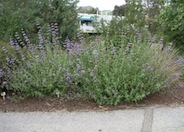
Common name:Deodar Cedar, Calif. Christmas Tree
Botanical name:Cedrus deodara
This fast-growing, coniferous evergreen is capable of reaching a size of 80' high by 40' wide. Its needle show a light, slilvery green color.

Common name:Flannel Bush, Fremontia cv.
Botanical name:Fremontodendron 'California Glory'
This plant is a open and spreading evergreen shrub 10-20 ft. in height with many yellow flowers blooming in spring. It needs good drainage and little summer water. It is a native plant to California as the name suggests and it is drought tolerant.

Common name:Deer Grass
Botanical name:Muhlenbergia rigens
The deer grass is a warm season perennial that forms dense clumps from the base. The spike like flower stalks grow 2-3 ft. tall and this grass has striking foundation form. The deer grass is native to California, is drought tolerant, and is a beneficial insect plant. -Cornflower Farms

Common name:Margarita Foothill Penstemon
Botanical name:Penstemon heterophyllus 'Margarita Bop'
Another one of the easiest and most versatile California native plants. This is a hybrid penstemon; will produce beautiful purple/blue flowers through much of the year when spent flowers are removed. Foliage grows in low growing mats to 6-8"H x 12-18"W.

Common name:Common Blue Fescue, Blue Fescuegras
Botanical name:Festuca glauca
This groundcover/grass will grow less than 1' tall and has small, blue-green leaves.

Common name:Purple Sage
Botanical name:Salvia leucophylla
The purple sage is an evergreen shrub that grows 2-3' tall by 5-6' wide. It has white tomentose stems and leaves and light purple flowers that bloom between May and June. This shrub tolerates heat and drought. The purple sage is a California native. -Cornflower Farms

Common name:Sentinel Manzanita
Botanical name:Arctostaphylos densiflora 'Sentinel'
This Vine Hill Manzanita grows 6-8' high and 5-8' wide, has rose/white flowers, and is upright. Good soil drainage is essential.
Healthy soil is the cornerstone of a vibrant landscape. It provides oxygen and nutrients vital to plant growth and sustenance. It provides protection from the sun and stability for root systems.
Click in the green box for more information
Designer: Urban Flora Landscape Design
Photographer: GardenSoft
Incorporate compost 6" into your soil to retain water, reduce compaction, feed earthworms, and provide valuable nutrients to your plants.
Mulching and adding compost to soil can minimize evaporation and help soil absorb and store water.
Develop healthy soil for plants that are vigorous and naturally pest-resistant.